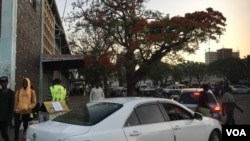The effects of a new tax on money transfers is taking hold in Zimbabwe.
The new levy imposed last week has been met by public outcry. Finance minister Mthuli Ncube said last week the two-percent tax would be used for roads and the health and education sectors.
Zimbabweans complain that they were already struggling to make ends meet.
Prices of basic goods like cooking oil and flour have shot up since the tax was imposed on October 1.
In Harare, the capital, residents are flocking to stores to stock up on supplies fearing that there will soon be a shortage of other commodities like milk, bread and sugar.
"People are not sure where we are going with this situation there is no money but prices of basic goods are are shooting daily, some goods are no longer available while other shops have already closed, so people are rushing to those shops that are still open to stock up," said Terrence Banda, a Harare Resident.
The tax will be applied on mobile and card payments as well as bank transfers above $US10 with exceptions for foreign payments and transfer of government funds.
Oil companies temporarily stopped delivering fuel causing shortages. The prices of medical drugs have also spiked in the last few days.
President Emmerson Mnangagwa said on Monday that the new tax was a painful but necessary step.
Business owners and ordinary citizens have cried foul, saying they would be paying for the government's profligate spending.
"The problems that Zimbabwe is facing right now are not the creation of the current guy or the current government no, its the actions, results of sabotage where there are rogue elements hell-bent on destroying the economy, that's why there food shortages and everything ,prices skyrocketing by 300% in a day, prices not in anyway linked to the tax or to the fuel, so this is totally a result of sabotage," said Moreprecision Muzadzi, a Harare resident.
Economic analysts said the tax would raise nearly 2 billion US dollars annually.
Nelson Banya is an economic analyst based in Harare who says Zimbabwe will need more than that.
"What would be more needful in our current circumstances is a bailout which bailout is tied to your ability to service our arrears and that's one of the issues the Finance minister has identified as priority and he is actually in Bali ,Indonesia as we speak to try and re-engage the international lenders and see if Zimbabwe can get some sort of bailout package of the order of a couple of billions, without that I do not see this situation being resolved anytime soon," he said.
Zimbabwe is facing acute shortages of US dollars, which the country adopted in 2009 when it abandoned its own currency after hyperinflation made it worthless.
(Reuters)




